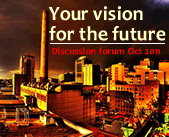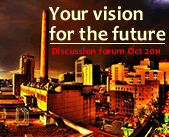
The rise of the digital economy has brought with it a host of new issues surrounding cyber security. Like other countries around the world, Australia is still grappling with its cyber safety future.
How quickly the convenience now offered by real-time social communication, on-line shopping, internet banking and the apparent wisdom provided by access to Google and Wikipedia, just becomes part of the everyday. Now all that stuff is just background. Like hot water and service stations. We are much more likely to be exercised, rightly or wrongly, by the Wikileaks episode.
We are thrilled by the thought that the Mubarak regime in Egypt was unable to close out the cyber-communications that brought down a 30-year dictatorship. We are chilled by the ways in which Alexander Lukashenko, President of Belorussia, uses the internet to spy on his citizens and re-birth a totalitarianism that would be the envy of Joseph Stalin. We are horrified by the possibility that Estonia was driven to a grinding, albeit temporary, halt by cyber warfare driven (allegedly) out of Russia. In the United Kingdom is it cyber security that is offered by 4.2 million CCTVs or is it the first step towards a ‘big brother’ police state?

This look at setting a new direction for cyber security enhancement has adopted
four situational scenarios designed as a stimulant for response.
Open Forum members are asked to consider their level of personal and social concern regarding each scenario. Which scenario poses the greatest risks for our society in the near future? Are the risks inherent in each scenario acceptable in light of the positives that are also evident? What actions should, or could, be taken in the here-and-now to minimise expected near future negative impacts in each?
1. Cyber theft – Very soon there will be virtually no form of commercial transaction – personal or business – that is not conducted using some form of on-line hardware: eftpos machines, ATMs, personal computers, tablets and mobile phones. There are few people who have not heard tales of ATM scamming and other electronic theft. Equally, there are few who do not see the huge advances that such connectivity has bought to every corner of the world, developed and developing. Where will society find itself 10 years out if current trends continue? What initiatives can be introduced to reduce the risk and accentuate the positives?
2. Cyber espionage & warfare – Everything is connected to everything else. Remote sensing of domestic water usage. Smart management of electricity generation and distribution. Online commercial conferencing. Air traffic control. We can see real benefits in this connectivity. Yet the very connectivity that make these things possible, also makes them vulnerable to commercial and military espionage. De-facto warfare with huge costs, but no immediate bloodshed. Is it just paranoia to think that one nation could bring down another nation’s transport system, or collapse a national banking network, by hacking and viral infection? Or is this a real and present danger? If the latter, what should we be doing today that can better protect our national interests from third party interference – whether commercial or military?
3. Cyberterrorism – It may be relatively easy to extend the reach of a ‘Geneva Convention’ for the 21st century, or of an international court of commercial justice to deal with some of the concerns emerging in the ‘warfare’ scenario above. However, dealing with the madness of terrorism or individual anarchy is a more complicated matter. The enemy is harder to identify, their incentives obscure, their actions generally less predictable and, although event outcomes may be on a smaller scale, their impact is nevertheless deeply felt. However, ensuring a zero-risk society would require civil and social controls that might be so intrusive as to be unacceptable to most of us. What level of risk is considered reasonable if by living with some risk we are also left to live our lives in relative freedom?
4. Cyber nanny – There was a time when the reach of fundamentalists, sexual predators and other scam artists was limited by the bounds of a congregation, the school grounds or the golf club bar. Today social networks allow universal access to deliver instructions on how to build a dirty bomb, view child pornography, purchase illegal drugs or help lighten the ‘Nigeria Department of Natural Resources’ of a conveniently overlooked US$25 million. On the other had there is no part of society that has not been enriched by distance education, access to old friends, communication with travelling family, or on-line medical consultation. Is it necessary to limit access to the good to ensure protection from the bad? Can a nanny state improve our lives and build our trust in technology? Or are individuals and families responsible for their own wellbeing and protection?
Open Forum member feedback
Your comments on these four near future scenarios and suggestions for action now will be used to refine The Future Project’s proposed ‘issue & scenarios posting’ on cyber security risks. With that posting to access a wider spectrum of social networks, and reach a global audience for the aggregation of crowd wisdom into public debate of, and policy action on, this crucial issue.
The Futures Project
The Futures Project is focused on a single ambition: directing the wisdom of crowds at encouraging government and business clients to shift their emphasis from hindsight and daily ‘fire fighting’ to the application of insight and foresight in preparing society now for better outcomes in the near future.
Fergus Neilson is Co-Founder of The Futures Project. Fergus brings a wide range of business and life skills gathered from a career in the armed forces, investment banking, the United Nations, McKinsey & Company and private equity investment. Always sceptical of solutions imposed ‘top-down’ and increasingly frustrated by the default position that invariably sees cleaning equipment bought in only after the proverbial has hit the fan. Fergus can be contacted at Fergus.Neilson@dif.com.au

 This look at setting a new direction for cyber security enhancement has adopted four situational scenarios designed as a stimulant for response.
This look at setting a new direction for cyber security enhancement has adopted four situational scenarios designed as a stimulant for response.














